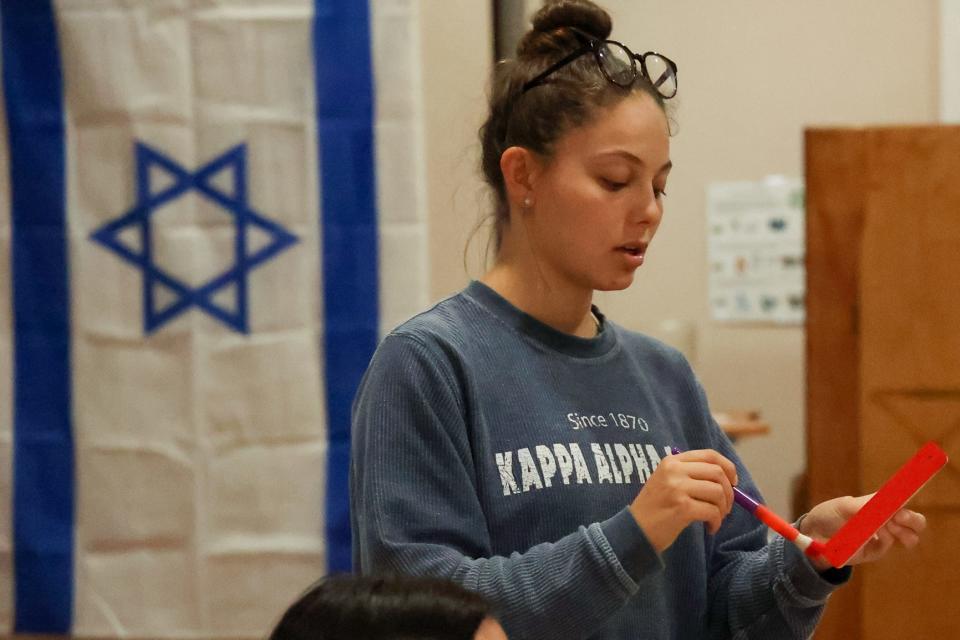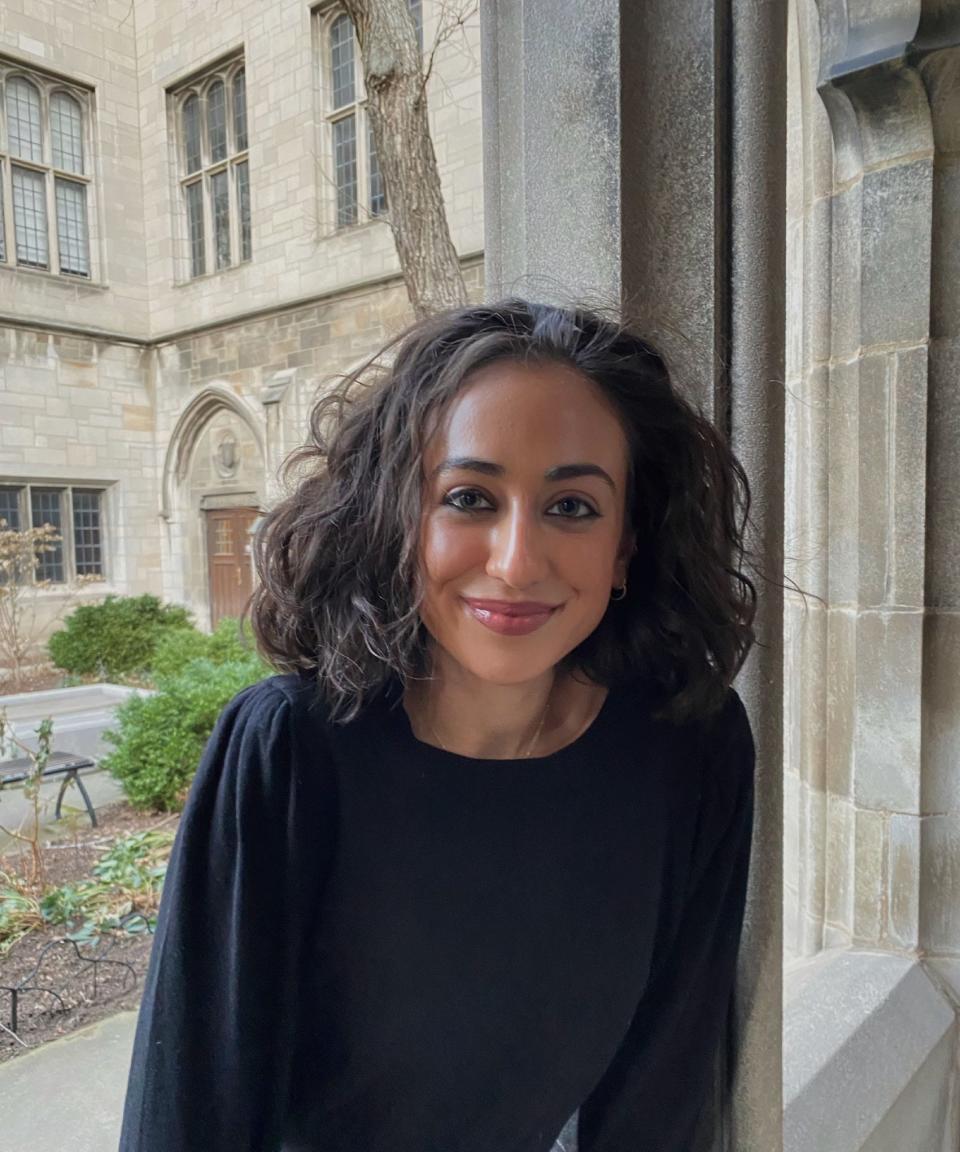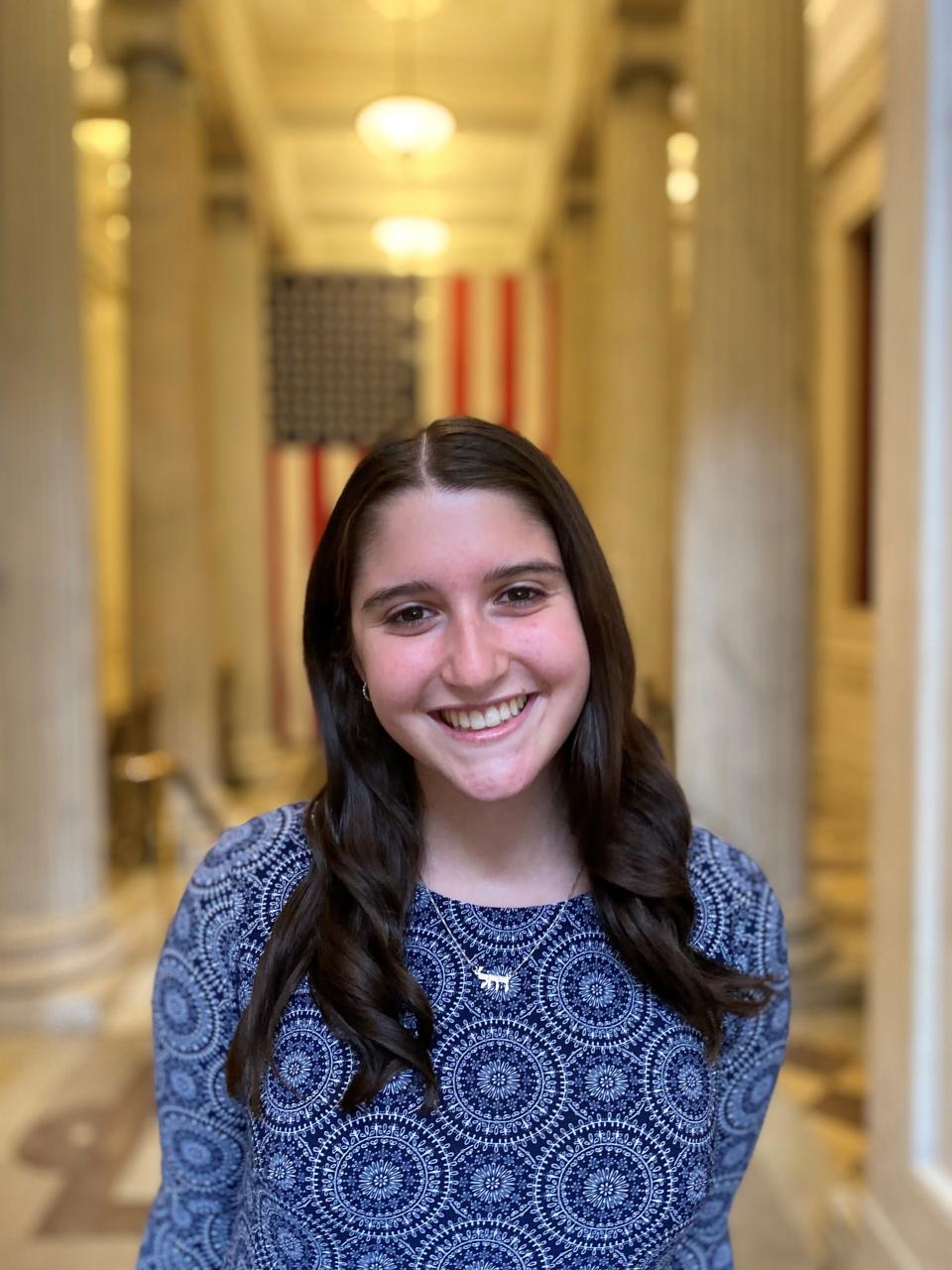‘Fighting with love:’ Jewish students stand up, push back against campus antisemitism
When Kaylee Werner arrived at Indiana University in the fall of 2021, she was shocked by the hostility to Jewish students on the Bloomington campus.
Her peers had been harassed in their dorms, six swastikas were discovered drawn on campus buildings and an anonymous user on Greekrank, a popular college forum, posted that Jewish students should go back to "the gas chambers where they all belong," she recalled.
Then Werner heard vandals had defaced or removed mezuzahs, the tiny prayer scrolls many Jews affix to their doorposts to symbolize their faith. And she decided she'd had enough.

Hatred against Jews was nothing new to Werner. The business major grew up attending the Tree of Life Congregation in Pittsburgh. In 2018, the synagogue was the site of the deadliest mass shooting ever to target American Jews. A white supremacist gunman killed 11 congregants.
Werner wasn't at the temple at the time of the shooting, but it left its mark. "To have what happened in my community is kind of a lot to think about," she said. "It's all the more reason why I felt I needed to do something" on campus.
Werner isn't the only student fed up with antisemitism at U.S. colleges. In dozens of interviews over the past year, NorthJersey.com spoke with young Jews across the country who said they've faced harassment and intimidation on campus. Many have launched initiatives to combat rising anti-Jewish activity from left and right.
Tired of hiding Jews at U.S. colleges face rising antisemitism from left and right
Indiana University's little red mezuzahs
Werner, now a junior, joined a campus task force and came up with an idea: For every mezuzah torn down on campus, "we put 50 in its place," she said. "We created red mezuzahs that are symbolic: They say `I stand with our Jewish neighbors.'"
In the first three weeks, 30 mezuzahs were installed around campus. The task force was inundated with so many requests for the little red boxes that they ran out, said Rabbi Sue Silberberg of the Hillel Center, a Jewish organization at Indiana University. As of May, over 1,000 have been distributed around campus, she said.

Werner found many classmates had never met a Jew and weren't even familiar with the term "antisemitism."
"I say, you're talking to one," she explained. "We want to share our love for Judaism. We want to share our love for our bubbe's matzo ball soup and all the things we love about being Jewish. I wear a Hebrew necklace and people ask what it means. I want everyone to know that I'm Jewish. I want to teach them about my culture.
"We're combatting hate with love."
Around the country, reports of antisemitic activity on college campuses have soared in recent years, mirroring an increase in the wider culture. AMCHA Initiative, a watchdog group based in Santa Cruz, California, that combats such harassment says it recorded 860 antisemitic incidents on U.S. college campuses in 2021 and 820 in 2022. The group has recorded 441 incidents in 2023.
Werner's mezuzah onslaught is just one effort among many. Here's a look at how Jews around the U.S. are making their voices heard in the fight against hate on college campus.
Montclair, New Jersey: JewBelong gets snarky
"There's been a normalization of antisemitism," said Archie Gottesman, co-founder of JewBelong, a Montclair-based nonprofit. The group was created in 2017 to draw "disengaged Jews" back to the faith, but it started focusing on antisemitism as attacks against the community grew.
"We are appalled by the hate we're seeing on college campus," said Gottesman. "This country is having an important conversation about diversity and equality, but antisemitism is being left off the agenda and that's wrong,"
JewBelong has chosen to spread its message with an in-your-face attitude familiar to any New York Jew: It's paid for pink neon billboards around the country that call out antisemitism using snarky slogans.
Among the messages plastered on signs near bus stops and college campuses and even in New York's Times Square: "Being woke and antisemitic is like being a vegan who eats veal."
Another declares, "Here's an idea: Let's ask everyone who's wondering if antisemitism is real to wear a yarmulke for a week and then report back."
The group has also sent billboard trucks to over 60 college campuses − including Princeton University, the University of Pennsylvania, Northwestern University and Indiana University − to spread its messages about inclusivity.
That so much anti-Jewish activity is taking place on campus is particularly disturbing because institutions of higher learning have historically aimed to be bastions of tolerance, offering safety and freedom of thought to all, said Gottesman.
Israel at 75: Ex-soldier, Muslim leader and others reflect on the Jewish state's legacy
University of Chicago: 'Jewish on Campus' harnesses Instagram

Julia Jassey, 22, a senior at the University of Chicago, said she's endured antisemitic slurs, death threats and jokes about the Holocaust online and from her peers.
When she recounted a campus incident she had faced to her Jewish friends, they nodded in recognition, said Jassey, who's from New York.
In the summer of 2020, she launched "Jewish on Campus," a grassroots campaign that invited Jewish students to submit stories of antisemitism through its Instagram page. The idea, she said, was to create a space where Jews could speak up about problems on campus. A team of volunteers and staff vet the reports to ensure their accuracy before they are posted, she said.
The page has more than 34,000 followers and has collected more than 2,200 submissions from students nationwide. Two-thirds of the reports have come from girls and women, and most incidents are characterized by historical antisemitic tropes about Jews being money-hungry or controlling the government and media, Jassey said.
University of Vermont: Student sparks federal investigation
Others have pushed back by filing complaints with the U.S Education Department, which is reviewing allegations at at least 10 colleges that administrators allowed antisemitism to go unchecked .
Avi Zatz of Teaneck was among the students who filed a complaint about the University of Vermont with the help of the Louis D. Brandeis Center for Human Rights, a Washington, D.C. -based nonprofit.
Growing up in suburban New Jersey, Zatz said he rarely encountered overt hatred in local schools. But when he arrived at the university's Burlington campus in 2021, he found an environment rife with animosity, he said.
"There were clubs that didn't allow Jews to join if they supported Israel," Zatz said. A teacher's assistant bragged online about lowering the grades of students who supported Israel. He said a group of students pelted his dorm, which is also a Jewish community center, with rocks and other debris one night.
"My friend opened the window to ask what they were doing, and they asked, `Are you Jewish?'" Zatz recalled. "When we said we were, they threw a rock straight at the window. Fortunately, it bounced off the screen."
A university investigation went nowehere, as did complaints to the school about the teaching assistant and clubs that excluded Jews, according to a complaint filed by Zatz and other students with the U.S. Education Department's Office of Civil Rights.
The university initially denied the allegations. But in April, the department announced the school had agreed to implement several reforms, including better defining antisemitism in its anti-discrimination policies, improved training for employees and new policies for reporting and responding to bias complaints.
The Brandeis Center called it a milestone in the campaign to get colleges and the U.S. government to take campus antisemitism more seriously.
American University: Frat brothers and a Holocaust survivor
Brandon Leach, a sophomore at American University in Washington, said, "When you get hit with different incidents, it's a horrendous feeling no matter how well prepared you are."
But he and his peers in Zeta Beta Tau (ZBT), a Jewish fraternity on campus, have pushed back. After swastikas were found on a dormitory wall during the Jewish high holidays last year, he organized a program on antisemitism.
On Holocaust Remembrance Day in April, he and his friends distributed free copies to fellow students of "Night," the classic book by Nobel Prize-winner Elie Wiesel, about the author's experiences in a Nazi death camp.
Leach, an international relations major from Maryland, said he regularly tries to converse with students who oppose the state of Israel. "The idea is not to convince them that I'm right but to show them that there's another side and that it's possible for both of us to learn from each other."
Northwestern University: Op-Ed breaks the silence

Lily Cohen, a junior at Northwestern University in Chicago, grew tired of staying silent about the hatred being spewed to Jewish students on campus so she wrote an op-ed for the student newspaper "The Daily Northwestern.
The title: "I am more proud of my Jewish identity than anyone can ever hate me for it."
"I was called a terrorist and a colonizer," said Cohen, who's from River Vale, New Jersey. But she also got messages from many Jewish students thanking her for "putting into words what they are afraid to say aloud. It speaks to a cultural problem that Jewish students on campus have been silenced about a part of their identity."
George Washington University: New Zionist Congress
Blake Flayton said his encounter with antisemitism at George Washington University turned out to be transformative. Flayton, originally from Arizona, arrived at the school in 2018. He wanted to join progressive movements on campus, but there was always a caveat, he said: "Any sense of Jewish peoplehood, we're told to check it at the door."
The 22-year old found many progressive organizations on campus refused to associate with Jewish students who support Israel.
As a college sophomore, he wrote an op-ed for The New York Times describing this phenomenon and was taunted for months by his peers, he said.
"My generation is so progressive minded and wants to help others but there's a different standard when it comes to Jews. We are considered white and powerful. At the same time, the white supremacists don't consider us white, " he wrote.
After graduation, Flayton co-founded New Zionist Congress, an educational organization that aims to strengthen Jewish identity as a defense against antisemitism. He also writes a column for Jewish media about antisemitism and Zionism and tweets pro-Jewish messages to his over 40,000 followers on twitter.
Despite those efforts, Flayton moved to Israel last year, deciding it was more conducive to the Jewish lifestyle he wanted. The hate he experienced on campus had a lot to do with the decision, he said.
San Diego State: 'Fighting with Love'
Maya Satnick, a recent graduate of San Diego State University in California, said that when she was a freshman, she was harassed by other students for wearing a a Star of David ring. At first, she felt traumatized by the experience and hid her Judaism from her peers.
But she eventually opted to fight back by getting involved in Jewish activities on campus. She recently helped organize an event called "Fighting Antisemitism, Fighting with Love" to raise awareness. The program featured music, dancing and a mentalist, along with speeches by students who shared how antisemitism had impacted them.
"We had 2,000 people show up," Satnick said. "It was a huge accomplishment. I hope it will be a model for students to take action against hate and to promote Jewish pride."
Where to get help
Several Jewish advocacy groups around the country have emerged in recent years to tackle the hate that Jewish college students have described, along with existing groups that have taken up the call:
ADL The Anti-Defamation League works to stop attacks against the Jewish people and secure justice and fair treatment for all.
Alums for Campus Fairness, a nonprofit founded in 2016, brings alumni together to counter anti-Israel voices on campus.
AMCHA Initiative investigates, documents and combats antisemitism at college campuses around the U.S.
Brandeis Center a nonprofit that works to combat antisemitism on campuses and files legal claims as part of its effort.
Hillel International is the world's largest Jewish campus organization.
SSI - STUDENTS SUPPORTING ISRAEL is an international campus movement committed to promoting a better understanding of Israel.
StandWithUs is an international group that fights antisemitism and supports Israel through educational programs at colleges, high schools and middle schools.
Zionist Organization of America is a national nonprofit that works to safeguard the rights of Israel and the Jewish people and combats antisemitism on college campuses.
Deena Yellin covers religion for NorthJersey.com. For unlimited access to her work covering how the spiritual intersects with our daily lives, please subscribe or activate your digital account today.
Email: yellin@northjersey.com
Twitter: @deenayellin
This article originally appeared on NorthJersey.com: Fighting college antisemitism: programs in NJ, nationwide fight back

